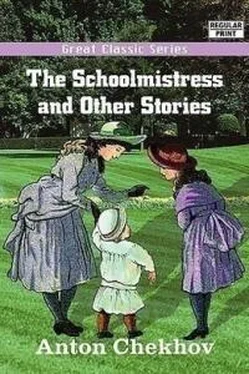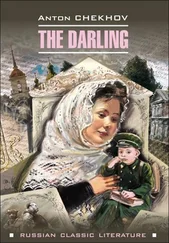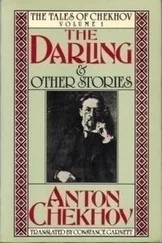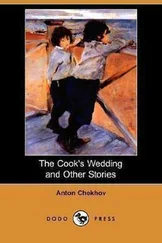My wife whispered a great deal more nonsense to me about her despotic uncle; about the weakness of mankind in general and of young wives in particular; about its being our duty to give shelter to all, even great sinners, and so on. Unable to make head or tail of it, I put on my new coat and went to make acquaintance with my "aunt."
A little woman with large black eyes was sitting at the table. My table, the gray walls, my roughly–made sofa, everything to the tiniest grain of dust seemed to have grown younger and more cheerful in the presence of this new, young, beautiful, and dissolute creature, who had a most subtle perfume about her. And that our visitor was a lady of easy virtue I could see from her smile, from her scent, from the peculiar way in which she glanced and made play with her eyelashes, from the tone in which she talked with my wife—a respectable woman. There was no need to tell me she had run away from her husband, that her husband was old and despotic, that she was good–natured and lively; I took it all in at the first glance. Indeed, it is doubtful whether there is a man in all Europe who cannot spot at the first glance a woman of a certain temperament.
"I did not know I had such a big nephew!" said my aunt, holding out her hand to me and smiling.
"And I did not know I had such a pretty aunt," I answered.
Supper began over again. The cork flew with a bang out of the second bottle, and my aunt swallowed half a glassful at a gulp, and when my wife went out of the room for a moment my aunt did not scruple to drain a full glass. I was drunk both with the wine and with the presence of a woman. Do you remember the song?
"Eyes black as pitch, eyes full of passion,
Eyes burning bright and beautiful,
How I love you,
How I fear you!"
I don't remember what happened next. Anyone who wants to know how love begins may read novels and long stories; I will put it shortly and in the words of the same silly song:
"It was an evil hour
When first I met you."
Everything went head over heels to the devil. I remember a fearful, frantic whirlwind which sent me flying round like a feather. It lasted a long while, and swept from the face of the earth my wife and my aunt herself and my strength. From the little station in the steppe it has flung me, as you see, into this dark street.
Now tell me what further evil can happen to me?
NADYA ZELENIN had just come back with her mamma from the theatre where she had seen a performance of "Yevgeny Onyegin." As soon as she reached her own room she threw off her dress, let down her hair, and in her petticoat and white dressing–jacket hastily sat down to the table to write a letter like Tatyana's.
"I love you," she wrote, "but you do not love me, do not love me!"
She wrote it and laughed.
She was only sixteen and did not yet love anyone. She knew that an officer called Gorny and a student called Gruzdev loved her, but now after the opera she wanted to be doubtful of their love. To be unloved and unhappy—how interesting that was. There is something beautiful, touching, and poetical about it when one loves and the other is indifferent. Onyegin was interesting because he was not in love at all, and Tatyana was fascinating because she was so much in love; but if they had been equally in love with each other and had been happy, they would perhaps have seemed dull.
"Leave off declaring that you love me," Nadya went on writing, thinking of Gorny. "I cannot believe it. You are very clever, cultivated, serious, you have immense talent, and perhaps a brilliant future awaits you, while I am an uninteresting girl of no importance, and you know very well that I should be only a hindrance in your life. It is true that you were attracted by me and thought you had found your ideal in me, but that was a mistake, and now you are asking yourself in despair: 'Why did I meet that girl?' And only your goodness of heart prevents you from owning it to yourself…."
Nadya felt sorry for herself, she began to cry, and went on:
"It is hard for me to leave my mother and my brother, or I should take a nun's veil and go whither chance may lead me. And you would be left free and would love another. Oh, if I were dead!"
She could not make out what she had written through her tears; little rainbows were quivering on the table, on the floor, on the ceiling, as though she were looking through a prism. She could not write, she sank back in her easy–chair and fell to thinking of Gorny.
My God! how interesting, how fascinating men were! Nadya recalled the fine expression, ingratiating, guilty, and soft, which came into the officer's face when one argued about music with him, and the effort he made to prevent his voice from betraying his passion. In a society where cold haughtiness and indifference are regarded as signs of good breeding and gentlemanly bearing, one must conceal one's passions. And he did try to conceal them, but he did not succeed, and everyone knew very well that he had a passionate love of music. The endless discussions about music and the bold criticisms of people who knew nothing about it kept him always on the strain; he was frightened, timid, and silent. He played the piano magnificently, like a professional pianist, and if he had not been in the army he would certainly have been a famous musician.
The tears on her eyes dried. Nadya remembered that Gorny had declared his love at a Symphony concert, and again downstairs by the hatstand where there was a tremendous draught blowing in all directions.
"I am very glad that you have at last made the acquaintance of Gruzdev, our student friend," she went on writing. "He is a very clever man, and you will be sure to like him. He came to see us yesterday and stayed till two o'clock. We were all delighted with him, and I regretted that you had not come. He said a great deal that was remarkable."
Nadya laid her arms on the table and leaned her head on them, and her hair covered the letter. She recalled that the student, too, loved her, and that he had as much right to a letter from her as Gorny. Wouldn't it be better after all to write to Gruzdev? There was a stir of joy in her bosom for no reason whatever; at first the joy was small, and rolled in her bosom like an india–rubber ball; then it became more massive, bigger, and rushed like a wave. Nadya forgot Gorny and Gruzdev; her thoughts were in a tangle and her joy grew and grew; from her bosom it passed into her arms and legs, and it seemed as though a light, cool breeze were breathing on her head and ruffling her hair. Her shoulders quivered with subdued laughter, the table and the lamp chimney shook, too, and tears from her eyes splashed on the letter. She could not stop laughing, and to prove to herself that she was not laughing about nothing she made haste to think of something funny.
"What a funny poodle," she said, feeling as though she would choke with laughter. "What a funny poodle!"
She thought how, after tea the evening before, Gruzdev had played with Maxim the poodle, and afterwards had told them about a very intelligent poodle who had run after a crow in the yard, and the crow had looked round at him and said: "Oh, you scamp!"
The poodle, not knowing he had to do with a learned crow, was fearfully confused and retreated in perplexity, then began barking….
"No, I had better love Gruzdev," Nadya decided, and she tore up the letter to Gorny.
She fell to thinking of the student, of his love, of her love; but the thoughts in her head insisted on flowing in all directions, and she thought about everything—about her mother, about the street, about the pencil, about the piano…. She thought of them joyfully, and felt that everything was good, splendid, and her joy told her that this was not all, that in a little while it would be better still. Soon it would be spring, summer, going with her mother to Gorbiki. Gorny would come for his furlough, would walk about the garden with her and make love to her. Gruzdev would come too. He would play croquet and skittles with her, and would tell her wonderful things. She had a passionate longing for the garden, the darkness, the pure sky, the stars. Again her shoulders shook with laughter, and it seemed to her that there was a scent of wormwood in the room and that a twig was tapping at the window.
Читать дальше












